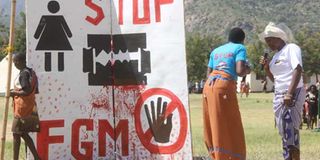Community dialogue a way to end FGM

Anti-FGM activists from stage a play campaigning against female circumcision. Over the years, there have been increased efforts to accelerate the ending of female genital mutilation. FILE PHOTO | NATION MEDIA GROUP
What you need to know:
One of the best methods involves working with men, boys, and religious leaders as change agents, which has proved successful.
The dialogues, which take place in informal settings such as under a tree, are organised with members of the same sex and within same age sets.
It gives them personalised space to question cultural beliefs and understand why FGM is harmful.
World Vision does not advocate communities adopting milder forms of the practice, such as ‘symbolic’ circumcision.
Over the years, there have been increased efforts to accelerate the ending of female genital mutilation (FGM). However, FGM is still prevalent among several communities.
The practice is common among the Kisii, at 84 per cent, Maasai (78 per cent), Somali (94 per cent) and Samburu (86 per cent), according to the Kenya Demographic Health Survey of 2014.
These statistics call for an urgent need to develop innovative ways to end FGM. World Vision, a humanitarian child-focused organisation, has adopted several integrated community-led initiatives.
One of the best methods involves working with men, boys, and religious leaders as change agents, which has proved successful.
Over the last two years, World Vision has adopted a community dialogue approach in the FGM hotspots of Narok, Samburu, Elgeyo Marakwet, Baringo, West Pokot and Kajiado. This has proven highly effective and sustainable.
CHANGE ATTITUDES
The dialogues tackle FGM, not as criticism of local culture, rather, as a better way to change community’s attitudes, perceptions and practices towards FGM.
These are intentional conversations among 10 to 15 community members within a village or manyatta.
The dialogues, which take place in informal settings such as under a tree, are organised with members of the same sex and within same age sets.
And later, with members of the opposite sex.
This is to allow community members of the same sex, to freely discuss intimately, cultural issues, perceptions and attitudes that they hold towards stopping FGM.
PERSONALISED SPACE
It gives them personalised space to question cultural beliefs and understand why FGM is harmful.
Trained community facilitators are identified as champions and change agents to walk other members towards rejecting FGM.
As the facilitators skilfully guide the dialogues, inhibited conversations flow and life changing transformation takes place.
EXPECTATIONS
As individuals embrace the idea, a domino effect takes place across the community.
This slowly becomes acceptable and social expectations are changed for good. Community members boldly make the decision “not to cut their daughters”.
However, it is important to note that not all community members who participate in the dialogues, change immediately.
After a series of dialogues, communities organise a forum where they make public the declaration to stop the practice across a sub-county or village. This involves performing traditional rituals that curse perpetrators of FGM. Reformed circumcisers abandon tools that have for many years robbed young girls of their innocence and health.
ALTERNATIVE RITES
The communities adopt alternative rites of passage for girls to equip them with life skills.
The declarations, which are a collective process, accelerate exposure of community members to correct information from trusted sources and encourage discussions on the harmful effects of FGM, the benefits of dropping the practice and possible alternatives.
Whereas, many may favour dropping the practice, a successful shift requires that they publicly manifest the will to do so.
World Vision does not advocate communities adopting milder forms of the practice, such as ‘symbolic’ circumcision.
In the past two years, we have successfully reached more than 350,000 community members, and over 200,000 boys and girls through the community dialogues.
This, in turn, has paved the way for 15 public community declarations and seen more than 5,000 children adopt alternative rites of passage.
Ms Koyiet is the national coordinator, gender and disability, World Vision Kenya. [email protected]





